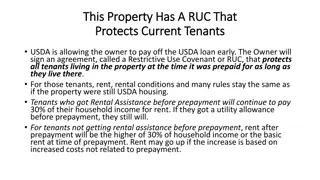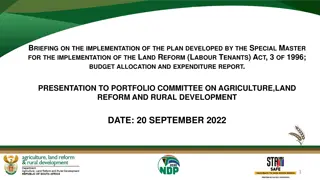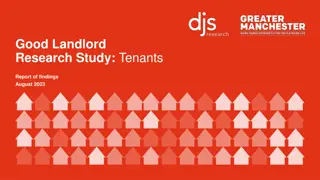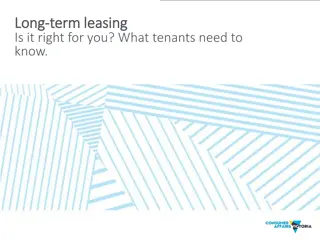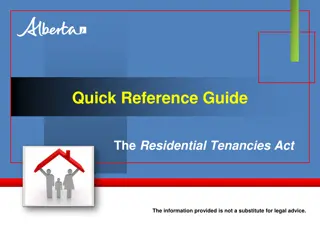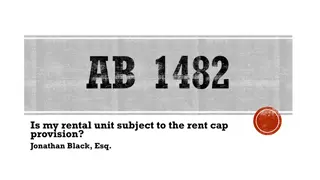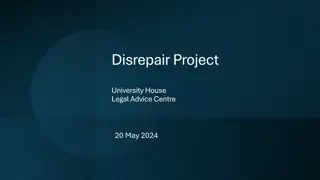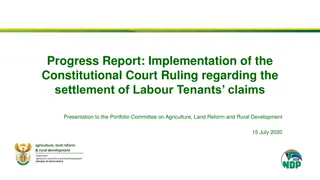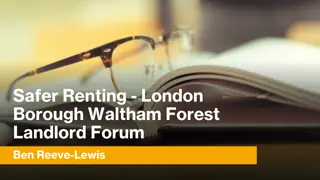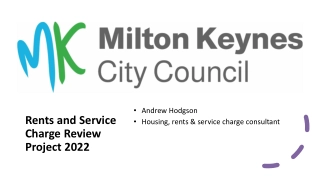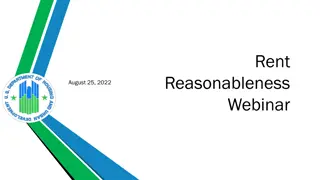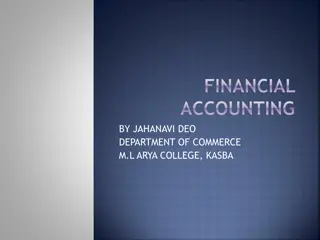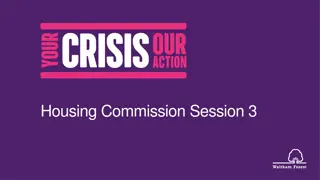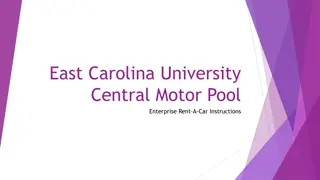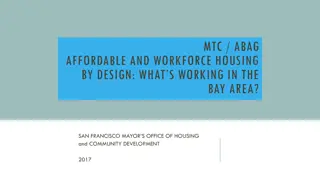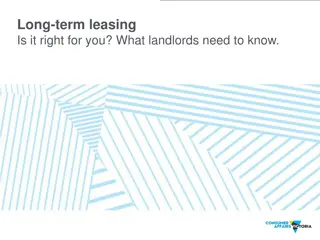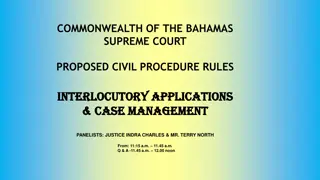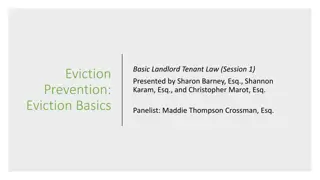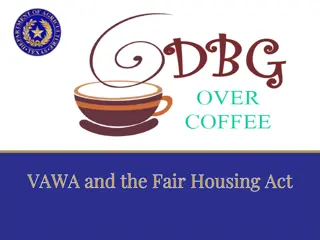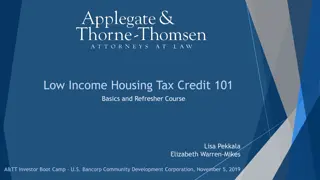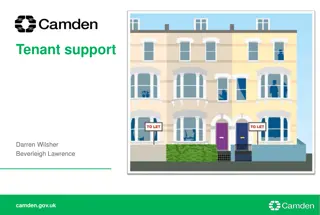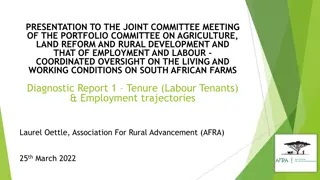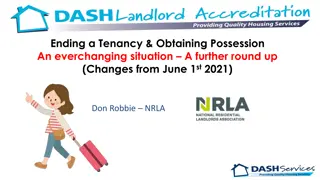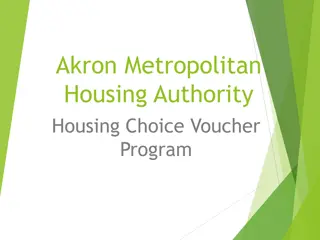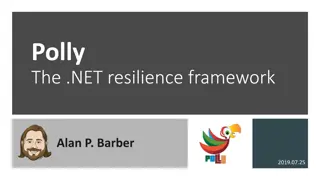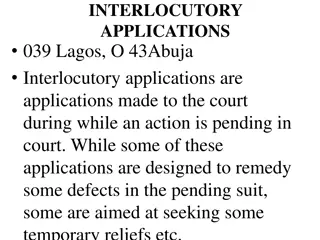Understanding Rent Increase Applications: A Guide for Tenants
Learn about the process when landlords apply for rent increases above the guideline, your rights and responsibilities as a tenant, and what to expect during hearings. Explore details such as landlord responsibilities, tenant duties, and key questions to ask regarding the work claimed to merit the increase. Arm yourself with knowledge and take action with your Tenant Association for support. Stay informed and prepared throughout the process.
Download Presentation

Please find below an Image/Link to download the presentation.
The content on the website is provided AS IS for your information and personal use only. It may not be sold, licensed, or shared on other websites without obtaining consent from the author. Download presentation by click this link. If you encounter any issues during the download, it is possible that the publisher has removed the file from their server.
E N D
Presentation Transcript
THE AGI A Nuts and Bolts Workshop Above Guideline Rent Increases From Mimico Estates Tenants' Association May 2021
Read Your Mail After you see the words Rent Increase -- keep reading The landlord has only made an Application to The Landlord and Tenant Board. It has not been approved. You now have the opportunity to examine what the landlord is claiming it did to merit a second rent increase in the same year.
Landlord Responsibilities The landlord must provide a hard copy of its claim at the site office or another place convenient for the tenant to view it. The landlord must at the tenant s request provide a CD of its Application for $5.00 The landlord s Application must include proof that the work it is claiming was completed and paid for.
Tenant Responsibilities Readthe landlord s application summary thoroughly to see if you agree with the extra charges. Make notes of your disagreements along with any questions you have. Plan to attend the hearing if at all possible. Remember 3% of $1,000.00 = $30/mth or $360.00 per year. That may be more than you earn in a day. Talk to your Tenant Association and your neighbours there is strength in numbers and information too!
Whats Next? You will be notified by mail of all hearing dates. The first hearing is a Case Management hearing to see if the landlord and tenant agree on the AGI. The adjudicator will usually ask questions such as: Have the landlord and tenants spoken about the AGI? Or Is there a possibility of settlement? When the adjudicator is satisfied there is no hope of agreement he/she will set a date for a hearing.
Its Not Hard The invoices, quotes, copies of cheques can grow into the hundreds of pages. Intimidating. BUT they are the same as any bill you get. Check the details. Is the work described clear enough so that you would pay it if it was something you ordered yourself? Does it match the quote? You need the basics: Who What Where When and Why
WWWWW The Five Ws Who Did The Work? Was it an independent company? Where was the work done? The exact address and area of the buildings if applicable (e.g. 5th Floor) What is the description of the work done? Is there a description at all? Why did the work need to be done? When was the work done? AGIs have deadlines.
You Are Paying the Bill You look to see if the bill is accurate Both description and amounts must be correct Does the invoice amount match the quote? Do you see any duplicate invoices? Did you check to see if the bill was paid on time Boring? Yes. Difficult? No.
Make Notes If your AGI includes many pages of claims (invoices/quotes/copies of cheques etc.) get organized I do it the old way with printed pages and sticky notes (an invaluable, time-saving tool) As you read each page asked yourself questions: Do you recognize what work was done? Does the invoice say where and when it was done?
Time to Ask Questions Directly Email, phone, or visit your site office to get the answers to your questions. Speak to your Tenant Association and your neighbours first. They are a valuable resource. Only then, contact the office. Do this in writing, either by letter or email. Remember, if there is no evidence, it did not happen. Listen carefully to their answers.
Leave Emotions at Home Above Guideline Rent Increases (AGIs) may seem unfair but this is NOT where you fix that. What will decrease the amount of the AGI is finding landlord s errors or mistakes on what work was done. Taking unfairness issues to the Landlord and Tenant Board will only prolong the process and results in more time off work or away from your life. Read the sections of the Residential Tenancies Act about AGIs and the regulations.
What to Look For Little or no explanation on the invoices. If you would not pay it yourself then get a detailed explanation Duplicates: In the larger, more complicated AGIs, more than one invoice for the same work is common. Has the job invoiced been finished. Only completed work can be included in an AGI. Is the address on the invoice correct? Details details details can mean thousands of $$$
Now You Can Be Heard Your first hearing is called a Case Management Hearing. It is where the Member (adjudicator) can decide if the AGI is ready to move forward The Member will ask tenants if they agree with the AGI terms. If you do not and if you need more information, this is when you request it. It is called a Request For Disclosure and must be in writing and very specific.
When You Get No Response If your landlord does not respond to your request, follow up with emails. If that fails: Explain at your next hearing why you cannot proceed because you do not have the information you require Ask the Member to write an Interim Order for the information you require.
Mediation Mediation You will be asked by The Member if you want to mediate. I always say yes because cooperation may move the matter forward. Mediation is run by an experienced Mediator who is trained in both landlord and tenant matters as well as successful ways to get opposing parties to communicate Mediation is absolutely confidential. Anything said in the mediation cannot be used later in a hearing.
The Merit Hearing If you fail to reach a settlement with your landlord, the next step is The Merit Hearing. As The Applicant, the landlord must present its case to convince the Tribunal (LTB) that it merits the extra amount of rent it is asking. The tenant is then asked to present its case to convince the presiding Member that it has erred and what, if anything, the landlord deserves.
The Deciding Factors The Deciding Factors The basis for all decisions at the Landlord and Tenant Board (LTB) is legislation. Primarily, The Residential Tenancies Act and its regulations. Also subsequent amendments and additional legislation have been added. Past decisions, though considered, are not precedents
Can I Appeal an LTB Decision ? Can I Appeal an LTB Decision ? At The Landlord and Tenant Board, an appeal is called a Request for Review You must fill out the correct forms and present your reasons why The Board (Member) made mistakes. If the LTB turns down your request, only then are you able to file with The Divisional Court. The Divisional Court is decided based on Common Law and uses precedents set in the past.
How much does it cost? If you have a low income, there is no charge for any filings with the LTB. All others pay a range of charges published on the LTB website. Paralegals and lawyers charges vary but experienced ones are hard to find. Even college curricula don t put much emphasis on tenant law. If you go to Divisional Court, it can be very expensive and is much more complicated than a Tribunal.
Financial Help is Available The Tenant Defense Fund offers some help for low income tenants to pay for legal help. E.g. $1,000.00 to hire a paralegal The Federation of Metro Tenants Associations administers the TDF and your residence must be have a tenants association to qualify BUT, AGIs are time consuming and the help available rarely covers the expense of doing a thorough job.
Legal Resources That Can Help The Federation of Metro Tenants Associations (FMTA) will help you get started. It has a special unit to help set up your tenants association and will then steer you to the groups best able to give you free legal advice by phone. The Law Society will give you names of paralegals and lawyers who may be able to help. Most will give you one half hour of advice FREE.
More Legal Help The Landlord and Tenant Board: (416) 645-8080 (416) 646-1772 The Federation of Metro Tenants Associations (FMTA): Community Legal Services: South Etobicoke: Your Local Clinic: The Centre for Equality in Accommodation (CERA): o knowledge of Human Rights and The Human Rights Tribunal (416) 252-7218 Call 311 (416) 944-0087 -30-


